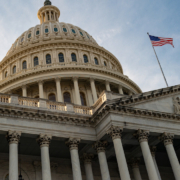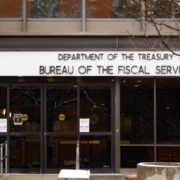How will the government shutdown impact mortgage rates?
The overall impact on real estate is expected to be minimal at first. But economists say a lengthy shutdown would hinder the already sluggish market.
Key points:
- The economic impact of the federal government shutdown has begun, with hundreds of thousands of federal workers expected to be furloughed.
- Mortgage rates are stable for now, but they could become volatile as credit concerns and a lack of economic data start weighing on investors.
- Authorization for the National Flood Insurance Program has lapsed, which housing experts say will hurt both new homeowners in flood-prone areas and those with expiring policies.
Now that the anticipated federal government shutdown is underway, the question becomes whether it will last long enough to further stall an already plodding housing market.
The first few days of a shutdown typically have little impact on homebuying and selling. In the case of this shutdown — the first since the record-setting 35-day shutdown ended in January 2019 — the drag on the economy would increase the longer that an estimated 750,000 furloughed federal employees, along with those still required to work, don’t get paid.
During previous shutdowns, politicians have often targeted the first military pay date as a reopening deadline, according to Chen Zhao, who leads Redfin’s economics research team. For the current shutdown, that would be Oct. 15.
“The immediate impact of a short, run-of-the-mill shutdown to both the housing market and financial markets would be minimal,” Zhao said. “But the ultimate impact depends on the length of the shutdown and which federal workers remain on the job.”
What will this mean for mortgage rates?
Mortgage rates could become volatile in the event of a lengthy shutdown. Rates typically drop over concerns that the economy is weakening before rising again once a shutdown ends.
However, rates could also increase if investors grow concerned about the credit quality of U.S. debt, said Melissa Cohn, regional vice president of William Raveis Mortgage.
For now, it’s “business as usual,” Cohn said, “but with delays on loans impacted by the shutdown, we’ll need to see what happens.”
The availability of government data could also impact mortgage rates. A key jobs report scheduled to be released on Oct. 3 will likely be delayed, along with other reports that the Federal Reserve uses to shape its monetary policy decisions. The next Fed meeting is scheduled for Oct. 28-29.
The current government shutdown had little initial impact on 30-year mortgage rates, with Mortgage News Daily pegging the rate at 6.37% on Oct. 1 — unchanged from one day earlier and around the same level as the few days prior.
The flood insurance problem
The National Association of Realtors has raised concerns about the National Flood Insurance Program (NFIP), the country’s largest flood insurance provider. The shutdown has led to a lapse in authorization, which could pose a problem in areas where flood insurance is required to complete a home sale.
Americans are currently unable to purchase new policies due to the shutdown, while current policyholders are unable to renew coverage.
NAR data indicates that the NFIP “is essential to 1,360 home sale closings daily, translating to approximately 41,300 affected monthly transactions nationwide.” Real estate transactions in flood-prone areas are expected to move forward without flood insurance, but this could become harmful to homeowners who have to deal with flooding during the peak hurricane season.
“Without access to flood insurance, American families must rely on federal disaster aid, which is severely limited,” NAR President Kevin Sears said in a Sept. 26 letter to congressional leaders.
Impact on the DC housing market
Given its concentration of federal employees, the housing market in Washington, D.C., is more exposed than other areas during a government shutdown. The region’s market had already weakened amid other government initiatives earlier this year, including Department of Government Efficiency layoffs, budget cuts and return-to-office mandates.
But those earlier changes haven’t translated to a major downturn in terms of price, according to Lisa Sturtevant, chief economist at Bright MLS. A lengthy shutdown might be the market’s tipping point.
“Although it is difficult to predict the extent of the impact, a prolonged government shutdown, or a shutdown that results in permanent workforce cuts, would lead to a slowdown in housing market activity and likely to year-over-year declines in home prices,” Sturtevant said, adding that the local market will likely rebound in the long term.













